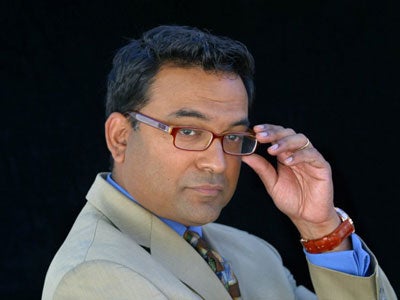Your support helps us to tell the story
From reproductive rights to climate change to Big Tech, The Independent is on the ground when the story is developing. Whether it's investigating the financials of Elon Musk's pro-Trump PAC or producing our latest documentary, 'The A Word', which shines a light on the American women fighting for reproductive rights, we know how important it is to parse out the facts from the messaging.
At such a critical moment in US history, we need reporters on the ground. Your donation allows us to keep sending journalists to speak to both sides of the story.
The Independent is trusted by Americans across the entire political spectrum. And unlike many other quality news outlets, we choose not to lock Americans out of our reporting and analysis with paywalls. We believe quality journalism should be available to everyone, paid for by those who can afford it.
Your support makes all the difference.TV psychiatrist Dr Raj Persaud today admitted using plagiarised material in a book and articles he wrote.
The doctor, who is famed for his regular appearances on daytime TV shows such as This Morning, admitted plagiarising four articles for his 2003 book 'From The Edge Of The Couch'.
A General Medical Council misconduct hearing in Manchester was told that Dr Persaud also admitted passing off other scholars' work as his own in articles published in journals and national newspapers.
Dr Persaud, who also appeared regularly on BBC Radio 4's All In The Mind programme, denied that his actions were dishonest and were liable to bring his profession into disrepute.
Jeremy Donne QC, GMC counsel, said: "The articles, we say, speak for themselves and they all demonstrate the extent Dr Persaud has appropriated the work of others as his own.
"We further allege that Dr Persaud has been dishonest... Dishonesty can be inferred from his repeated conduct in plagiarising the work of academics... thereby enhancing his professional reputation and standing with the public as well as enhancing himself in the press.
"His book went to the second edition and he was being paid for his articles.
"All of this was at the expense of the hard work and scholarship of other people."
Mr Donne also accused Dr Persaud of attempting to "exculpate" himself.
He said Dr Persaud blamed sub-editors after an article he wrote for the Times Educational Supplement (TES) in February 2005 failed to acknowledge the scholar whose work he plagiarised.
Professor Thomas Blass, of the University of Maryland, USA, complained about the article and was told, in an email by Dr Persaud, that he thought he had given him a mention.
Dr Persaud wrote: "When these columns are sub-edited a lot is often taken out and I don't get to see it before it goes out."
The TES acknowledged that Dr Persaud had "copied" the work of another scholar, Mr Donne said.
He added: "It's quite clear that the TES were not taking responsibility for subbing errors in their apology."
The GMC panel heard that allegations of plagiarism against Dr Persaud were first made in a Sunday Times article published in April 2006.
The article alleged that sections of Dr Persaud's book, published three years earlier, were plagiarised from academic articles.
At the time Dr Persaud was a consultant psychiatrist for the South London and Maudsley NHS Trust, a position he still holds.
He was also a director of the now defunct Centre for Public Engagement in Mental Health Sciences at the Institute of Psychiatry, Kings College, University of London.
He withdrew from this honorary position following the allegations.
Mr Donne said: "Dr Persaud is, and at the relevant time was one of the country's best known psychiatrists. As such we say he occupies a place of particular prominence."
Mr Donne said Dr Persaud was being "disingenuous" by claiming that he had acknowledged the original contributors to his book.
He said: "While it's true the book contains a general acknowledgement there's no, or certainly no adequate, attribution of the passages themselves."
Mr Donne also said that Dr Persaud's preamble and analysis of case studies in his book appeared as his own insights and opinions, "and not the work of the original authors".
He revealed that Dr Persaud asked for and received permission to quote an article by a Professor Bentall for his book.
He said: "Professor Bentall gave his permission assuming that Dr Persaud... would know that quotations would have appeared in parenthesis and be properly attributed.
"Having seen the passage Professor Bentall was astonished that a substantial portion of his paper had simply been copied into the book in what he believes was a deliberate act of plagiarism."
Mr Donne said the British Medical Journal (BMJ) was forced to issue an "unequivocal retraction" in September 2005 after publishing an article by Dr Persaud in which he failed to correctly attribute his work.
The doctor blamed a "cutting and pasting error", the panel heard.
The BMJ subsequently declined to publish another article by Dr Persaud, Mr Donne said.
Dr Persaud's articles appeared in journals including the British Medical Journal, Progress in Neurology and Psychiatry, and the Guardian and the Independent newspapers.
Dr Persaud appeared at the hearing dressed in a grey suit and black spectacles.
The GMC hearing was adjourned until 11am tomorrow.

Join our commenting forum
Join thought-provoking conversations, follow other Independent readers and see their replies
Comments